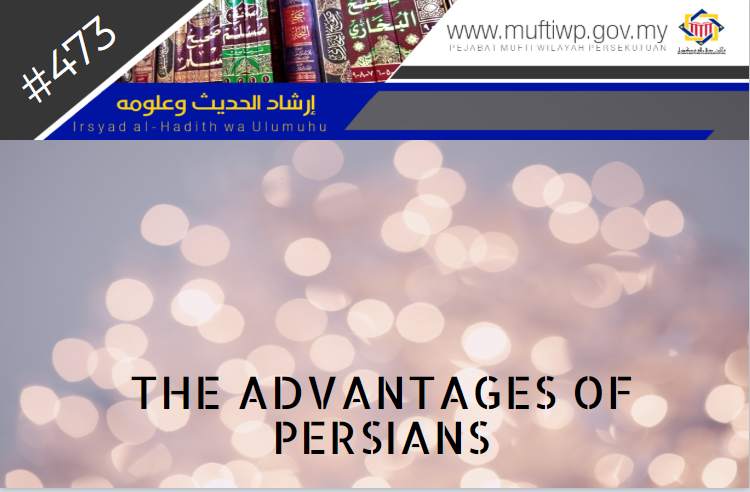Question:
Assalamualaikum SS Datuk Mufti. What is the status of this hadith?
لَوْ كَانَ الْعِلْمُ بِالثُّرَيَّا، لَتَنَاوَلَهُ نَاسٌ مِنْ أَبْنَاءِ فَارِسَ
“If faith were suspended from Pleiades, then it would be reached by men from Persia.”
Answer:
Waalaikumussalam wrt. wbt,
Alhamdulillah, praise and thanks to Allah for the countless blessings He has blessed us all with. Blessings and salutations to the Prophet Muhammad PBUH, his wives, his family, companions and all those that follow his teachings to the day of judgement.
According to the above question, the above hadith is narrated by Imam Ahmad in his musnad. [See: Musnad Ahmad (10057) (9440)] and also by Ibn Hibban in his sahih. [See: Sahih Ibn Hibban (7309)]. Furthermore, this hadith is also narrated with a slight difference in the matan but with the same meaning. Some of them are:
- From Abu Hurairah RA, the Prophet PBUH said:
لَوْ كَانَ الإِيمَانُ عِنْدَ الثُّرَيَّا، لَنَالَهُ رِجَالٌ - أَوْ رَجُلٌ - مِنْ هَؤُلاَءِ
“Even if faith were near the Pleiades, a man from amongst these (men from Persia) would surely find it.”
Sahih al-Bukhari (4897)
- From Abu Hurairah RA, th ePorphet PBUH said:
لَوْ كَانَ الْإِيمَانُ عِنْدَ الثُّرَيَّا، لَنَالَهُ رِجَالٌ مِنْ هَؤُلَاءِ
“Even if faith were near the Pleiades, a man from amongst these (men from Persia) would surely find it.”
Sahih Muslim (2546)
- From Abu Hurairah RA, the Prophet PBUH said:
لَوْ كَانَ الإِيمَانُ مَنُوطًا بِالثُّرَيَّا لَتَنَاوَلَهُ رِجَالٌ مِنْ فَارِسَ
“If faith were suspended from Pleiades, then it would be reached by children from Persia.”
Sunan al-Tirmizi (3261)
- From Abu Hurairah RA, the prophet PBUH said:
لَوْ كَانَ الْإِيمَانُ مُعَلَّقًا بِالثُّرَيَّا لَتَنَاوَلَهُ رِجَالٌ مِنْ قَوْمِ هَذَا
“Even if faith were near the Pleiades then it would be reached by these men (men from Persia).”
Narrated by Ibn Hibban (7308)
As for the status of this hadith, here we cite several opinions of scholars who evaluated this narration or hadith:
- Imam Ibn HIbban (354 H) evaluate the hadith as sahih with different sanad. (See: Sahih Ibn Hibban (7309), 16/299)
- Imam al-Suyuthi (911 H) state that the hadith is dhaif (weak) in his book. (See: al-Jami’ al-Saghir, 2/239)
- Syeikh Syu’aib al-Arna’outh (1438 H) evaluated the sanad of the hadith as dhaif (weak) because of Syahr bin Haushab. (See: Musnad Ahmad, 16/90)
Considering the above opinions of scholars, the above hadith is sahih according to the route or sanad from Imam al-Bukhari and Imam Muslim without the narrator named Syahr bin Haushab. Furthermore, this hadith generally discusses on the advantages of Persians when compared to other races. However, there are reasons as to why these words are uttered by the Prophet PBUH as explained clearly in another hadith:
- From Abu Hurairah RA, he said:
كُنَّا جُلُوسًا عِنْدَ النَّبِيِّ صَلَّى اللهُ عَلَيْهِ وَسَلَّمَ، فَأُنْزِلَتْ عَلَيْهِ سُورَةُ الجُمُعَةِ: (وَآخَرِينَ مِنْهُمْ لَمَّا يَلْحَقُوا بِهِمْ) [الجمعة: 3] قَالَ: قُلْتُ: مَنْ هُمْ يَا رَسُولَ اللَّهِ؟ فَلَمْ يُرَاجِعْهُ حَتَّى سَأَلَ ثَلاَثًا، وَفِينَا سَلْمَانُ الفَارِسِيُّ، وَضَعَ رَسُولُ اللَّهِ صَلَّى اللهُ عَلَيْهِ وَسَلَّمَ يَدَهُ عَلَى سَلْمَانَ، ثُمَّ قَالَ: لَوْ كَانَ الْإِيمَانُ عِنْدَ الثُّرَيَّا، لَنَالَهُ رِجَالٌ مِنْ هَؤُلَاءِ
While we were sitting with the Prophet (ﷺ) Surat Al-Jumu'a was revealed to him, and when the Verse, "And He (Allah) has sent him (Muhammad) also to other (Muslims)...' (62.3) was recited by the Prophet, I said, "Who are they, O Allah's Messenger (ﷺ)?" The Prophet (ﷺ) did not reply till I repeated my question thrice. At that time, Salman Al-Farisi was with us. So, Allah's Messenger (ﷺ) put his hand on Salman, saying, "If Faith were at (the place of) Ath-Thuraiya (pleiades, the highest star), even then (some men or man from these people (i.e. Salman's folk) would attain it."
Sahih Muslim (2546)
Thus, this hadith is the statement of the Prophet PBUH when the Prophet PBUH was praising his companion Salman al-Farisi who is a Persian. Moreover, Syeikh Mulla Ali al-Qari (1014 H) commented on the hadith saying that it may be because of the determination of Salman al-Farisi in his quest for the truth and guidance. This hadith may also refer to ‘ajam (foreigners or non-Arabs) as a whole (not specific to Persians) for all of them are included as the ignorant (those who has not receive guidance like the Arabs in the time of Jahiliyyah) or it is specific to only Persians (and not races other than Persians). (See: Mirqah al-Mafatih, 9/4005)
Furthermore, the meaning of Pleiades (in astronomy) is a group of open stars a part of the Taurus constellation. It is the clearest constellation of stars visible to the naked eye and closest to earth. (See : https://ms.wikipedia.org/wiki/Pleiades)
From the above explanation, numerous non-Arab scholars such as Abu Hanifah who is the founder of madhhab Hanafi in the field of Fiqh and the majority of hadith scholars are non-Arabs such as:
- Imam al-Bukhari
- Imam Muslim
- Imam al-Tirmizi
- Imam al-Nasa’ie
- Imam Ibn Majah
- Imam al-Hakim al-Naysaburi
However, the honour of an individual is not based solely on a person’s race. The reason is Arab is the most honoured race for the Prophet Muhammad PBUH is chosen by Allah SWT from this honoured race but when a person holds onto the truth and piety then he will be honoured regardless of his religion. Faith and taqwa are the true benchmark of a person’s honour, greatness and great character.
Conclusion
To conclude, the above hadith is sahih according to the route evaluated by Imam al-Bukhari and Imam Muslim in both sanad that they presented. Furthermore, the hadith also states the advantages of one of the honoured companions of the Prophet PBUH named Salman al-Farisi, that the Prophet PBUH included him as one of his family. Moreover, the above hadith shows that this religion will also be protected and maintained by races other than the Arabs and this is proven as there are several renowned non-Arabic scholars. Lastly, may Allah SWT make us from among His slaves who has taqwa and always contribute to this religion. Amin.
Wallahua’lam.


